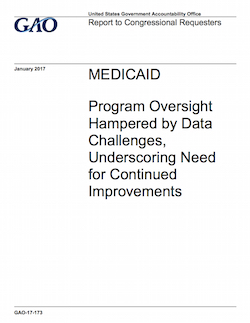
The incomplete, inaccurate and late reporting of Medicaid expenditure and utilization data makes it difficult for the Centers for Medicare & Medicaid Services to ensure that payments are proper and that beneficiaries have access to covered services, the Government Accountability Office said in a report made public Monday.
CMS, the GAO said, relies on two key data sources to oversee the Medicaid program: the CMS-64, which serves as the basis for calculating the amount of federal matching funds for states, and the Medicaid Statistical Information System, which is designed to report individual beneficiary claims data.
“The CMS-64 and MSIS have the potential to offer a robust view of payments, overall spending and services in the Medicaid program; however, GAO found that the usefulness of these data is limited because of issues with completeness, accuracy and timeliness,” the GAO said.
Currently, expenditure data do not provide complete or accurate information on how states finance their portion of program costs, and utilization data are incomplete and are reported up to three years late, according to the GAO.
The key initiative for improving Medicaid data and program oversight is the Transformed Medicaid Statistical Information System, or T-MSIS, CMS said. As of October, however, only 18 states were submitting T-MSIS data, although CMS estimated at the time of its research that states representing more than 70% of Medicaid beneficiaries would be submitting such data by the end of 2016.
The report recommended that CMS expedite efforts to assess and ensure the quality of T-MSIS data. The Department of Health and Human Services agreed with the recommendation, according to the GAO.
The GAO prepared the report at the request of some members of Congress. The office reviewed agency guidance, laws, regulations and federal internal control standards; examined reports from the GAO and others; and interviewed CMS officials about the agency’s data challenges and initiatives.



